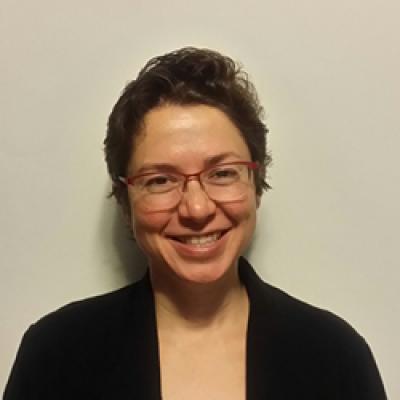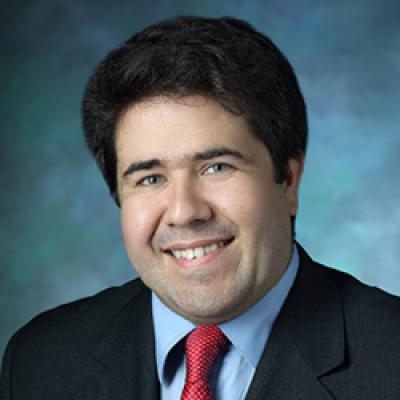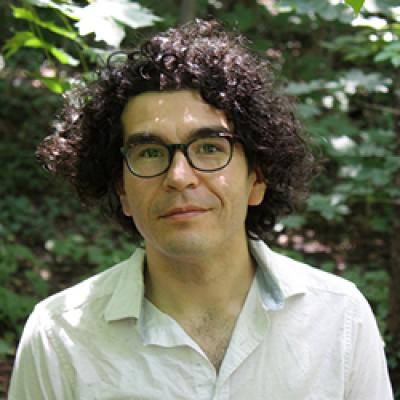Get to know our experts
We’re proud to celebrate Hispanic Heritage Month by highlighting several Hispanic/Latino researchers and eye care professionals. They have made invaluable contributions to NEI’s mission to understand, prevent, and treat blinding eye diseases. These experts serve as inspiration to many Hispanics/Latinos across the country who hope to become scientists.

Eduardo Alfonso, M.D.
(NEHEP Planning Committee member)
Dr. Alfonso is the Chairman of the Department of Ophthalmology of the University of Miami Miller School of Medicine and Director of the Bascom Palmer Eye Institute. He serves on the NEHEP Planning Committee and the National Advisory Eye Council (NAEC). Additionally, as a member of the NAEC, Dr. Alfonso has supported the Audacious Goals Initiative. Dr. Alfonso is a NEHEP Spokesperson for NEI.
Areas of expertise:
- Eye diseases, corneal surgery, corneal transplantation
- Ocular microbiology
- Bacterial and fungal sensitivity
- Development and clinical applications of a keratoprosthesis
What is the most important advice you would give young Hispanics/Latinos who want to become scientists?
It is important to feel a passion for what you do every day. If you are passionate about science, do not let small obstacles get in the way of your pursuits. Look at the many role models of Hispanic/Latino scientists involved in the sciences now, and the many thousands that have done it in the past. If they have been inspired by science and have pursued their passion, why can’t you?

Hanna Rodríguez Coleman, M.D.
(NEHEP Planning Committee member)
Dr. Coleman is an Assistant Clinical Professor at New York Presbyterian Hospital and Associate Medical Director at the Digital Angiography Reading Center in New York. She’s also a member of the American Academy of Ophthalmology, New York State Ophthalmological Society, and the American Medical Association. Dr. Coleman is a NEHEP Spokesperson for NEI.
Areas of expertise:
- Ophthalmology
- Retinal diseases
- Diabetic macular edema
- Age-related macular degeneration
What is the most important advice you would give young Hispanics/Latinos who want to become scientists?
Spend time with yourself and recognize what your interests and goals are. Then, start taking the steps towards them. Don't be afraid of how long something might take to complete. Time will go by fast no matter what, so choose the career you want.

Michael Maldonado, O.D., M.B.A.
(NEHEP Planning Committee member)
Dr. Maldonado is a faculty member at the Texas Tech Ophthalmology Clinic. He trains residents and medical students on ocular disease and pathology of vision. Dr. Maldonado serves the Board of Trustees for the Texas Optometric Association, the El Paso Optometric Society as President, and the Board of Directors for the El Paso Diabetes Association.
Areas of expertise:
- Glaucoma
- Optometry
- Ocular disease
- Pathology of vision
What is the most important advice you would give young Hispanics/Latinos who want to become scientists?
I believe that anyone can be a doctor as long as they have the strong desire to go the distance. There will always be barriers that will make someone want to give up, but mental endurance and the willingness to keep trying will make it happen.

Joseph Arboleda-Velasquez, M.D., Ph.D.
Dr. Arboleda-Velasquez is an Assistant Professor of Ophthalmology at the Schepens Eye Research Institute of Massachusetts Eye and Ear within the Department of Ophthalmology at Harvard Medical School. His research seeks to explain the biology and pathophysiology underlying small-vessel diseases, including diabetic retinopathy. Dr. Arboleda-Velasquez’s research aims to develop therapeutic approaches for treatment bypassing the need for intravitreal injections.
Areas of expertise:
- Age-related macular degeneration
- Diabetic eye disease
- Small-vessel diseases
- Diabetic retinopathy
What is the most important advice you would give young Hispanics/Latinos who want to become scientists?
I think it is important to embrace who you are and let people know what you bring to the table. It is not only important to do great work. It is essential to communicate your science and make sure people understand your research goals.

John Gonzales, M.D.
Dr. Gonzales is an Assistant Professor of Ophthalmology at the University of California at San Francisco. His interest involves the diagnosis and management of infectious and non-infectious inflammatory conditions of the eye (uveitis). Dr. Gonzales is currently the Principal Investigator for the research study Non- Sjögren's Syndrome- and Sjögren's Syndrome-related Keratoconjunctivitis SICCA: A Spectrum of Inflammatory Dry Eye (NIH/NEI K23EY026998).
Areas of expertise:
- Retinal and corneal viral infections and dry eye
- Infectious and non-infectious inflammatory conditions of the eye (uveitis)
- Non-Sjögren’s syndrome- and Sjögren’s syndrome-related keratoconjunctivitis
What inspired you to study the eye?
There was something about the eye that drew me to appreciate it. I still derive a great sense of adventure every time I look into someone's eye to examine their retina. To me it's like diving underwater and exploring a whole new world.

Luis Martinez-Velazquez, Ph.D.
Dr. Martinez-Velazquez is currently completing his medical school training as part of the combined M.D./Ph.D. program in the Department of Neuroscience and Physiology at New York University School of Medicine. He completed his Ph.D. training in 2017, and he hopes to pursue a residency in ophthalmology after receiving his M.D. early next year. His research interests involve the cellular neuroscience of genetic conditions that cause loss of vision, particularly retinal degeneration. His goal is to contribute to the understanding of the normal function of genes associated with retinal dystrophies, with the hope that placing these genes into molecular pathways can help generate appropriate therapies to treat vision loss. Dr. Martinez-Velazquez was the Principal Investigator for a Predoctoral Fellowship titled Determining the Function of Retinal Degeneration 3 in Ciliated Sensory Neurons (NIH/NEI EY024836).
Areas of expertise:
- Cell and molecular biology
- Retinal degeneration
What is the most important advice you would give young Hispanics/Latinos who want to become scientists?
Go for it! You bring your unique background, experiences, and interests with you — which can help you answer questions that others might not have thought about yet.

Jorge Otero-Millan, Ph.D.
Dr. Otero-Millan is a Postdoctoral Fellow in the Department of Neurology at Johns Hopkins University, where he studies visual vestibular neuroscience. His research focuses on eye movement analysis in both healthy and unhealthy populations. Dr. Otero-Millan’s research seeks to understand the eye movements that occur when we tilt our heads and how they affect our perception of upright. He hopes to develop new diagnostic techniques and treatments for patients suffering from various types of visual disabilities. Currently, he supports the NEI research study, Exploring the Role of Temporoparietal Cortex in Upright Perception and the Link With Torsional Eye Position (NEI K99EY027846).
Areas of expertise:
- Behavioral neuroscience
- Cognitive neuroscience
- Visual neuroscience
- Visual processing
- Motion perception
- Saccades
Why did you decide to become a scientist?
Soon after graduating as an engineer, I had an opportunity to come to the United States and work in a neuroscience laboratory. I did not know much about neuroscience at the time, but I soon became fascinated by it. Although we know a lot about how our brains work, there’s still so much to discover.

Dolly Ann Padovani-Claudio, M.D., Ph.D.
Dr. Padovani-Claudio is an Assistant Professor of Pediatric Ophthalmology and Strabismus in the Department of Ophthalmology and Visual Sciences at Vanderbilt University Medical Center. Dr. Padovani-Claudio’s research aims to better understand the role of select molecules in the body, known as chemokines, in mediating inflammation and new vessel growth in the retina.
Areas of expertise:
- Retinopathy of prematurity
- Diabetic retinopathy
- Pediatric ophthalmology
- Pediatric and adult strabismus
- Vascular diseases of the retina
Why did you decide to become a scientist?
During my first summer research experience, I learned that there is no such thing as incorrect results from a well-designed and executed experiment — it will always provide knowledge, regardless if the results fit one’s hypothesis. I was fascinated by this concept.

Alexandro Ramirez, Ph.D.
Dr. Ramirez is a Postdoctoral Researcher at Weill Cornell Medical College where he focuses on systems neuroscience. He studies how networks of neurons are able to initiate eye movements, and hopes to improve treatments when these networks don’t work properly. Dr. Ramirez received the NIH K99/R00 Career Transition Award in 2017.
Areas of expertise:
- Neuroscience
- Microscopy
- Applied statistics
What is the most important advice you would give young Hispanics/Latinos who want to become scientists?
Seek out research experience as early as possible. Reach out to your teachers or other faculty to learn about opportunities to get into research.

Gabriel Velez, M.D., Ph.D. candidate
Gabriel Velez is an M.D., Ph.D. candidate and Alfred P. Sloan Scholar at the University of Iowa Carver College of Medicine Medical Scientist Training Program. He’s currently completing his Ph.D. thesis work as a visiting scholar at Stanford University. Mr. Velez is studying the structure and function of the calpain-5 (CAPN5) protein and its role in the development of a rare blinding eye disease known as autosomal dominant neovascularinflammatory vitreoretinopathy (ADNIV).
Areas of expertise
- Translational proteomics
- Structural biology
- Enzymology
- Drug design
- Molecular modeling
- Bioinformatics
What is the most important advice you would give young Hispanics/Latinos who want to become scientists?
Find good mentors early in your career. Having great mentors will contribute significantly to your intellectual and professional development, especially during critical transition points. Also, enjoy the challenge! Scientific and medical training can be overwhelming, but the effort is worth it.

Elizabeth Zuniga-Sanchez, Ph.D.
Dr. Zuniga-Sanchez is a Postdoctoral Scholar at the Howard Hughes Medical Institute, University of California, Los Angeles. Her research focuses on identifying the factors that mediate the selective wiring of photoreceptors to bipolar cells. Dr. Zuniga-Sanchez’s ultimate goal is to develop better therapeutic approaches to restore vision in people with retinal disease. Dr. Zuniga-Sanchez was the recipient of NEI’s K99 Pathway to Independence Award in 2017.
Areas of expertise:
- Neurodevelopment
- Synapse formation
- Retinal circuit assembly
Why did you decide to become a scientist?
At first, I did not know I wanted to pursue a career in science. However, I became interested in science when my brother David was born with Down syndrome. I wondered how the brain develops — and why some children, like my brother, were born with severe learning disabilities.